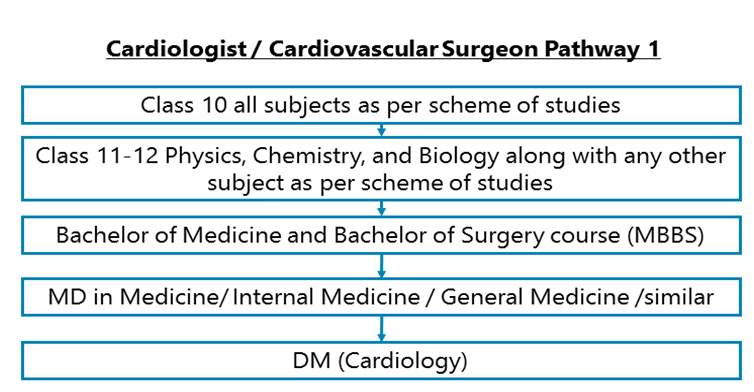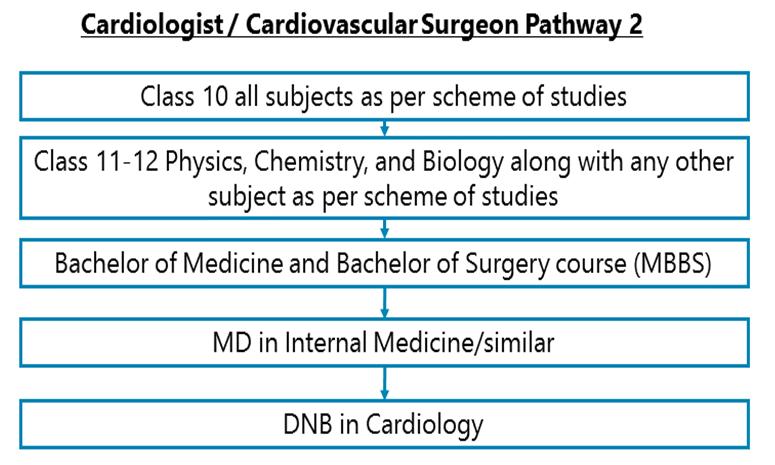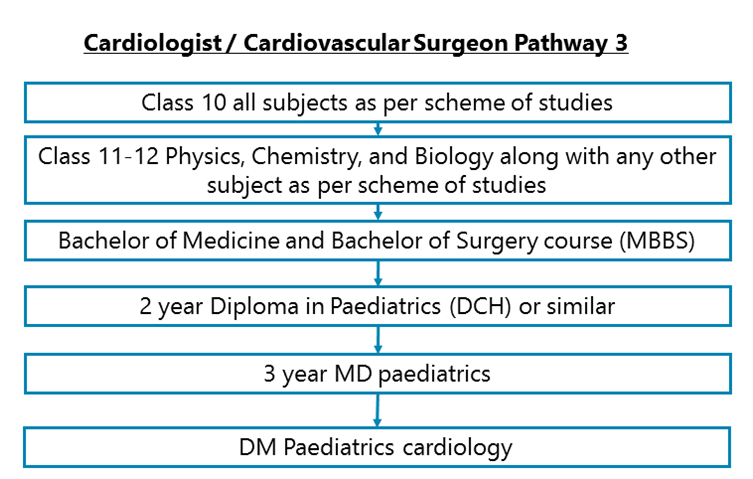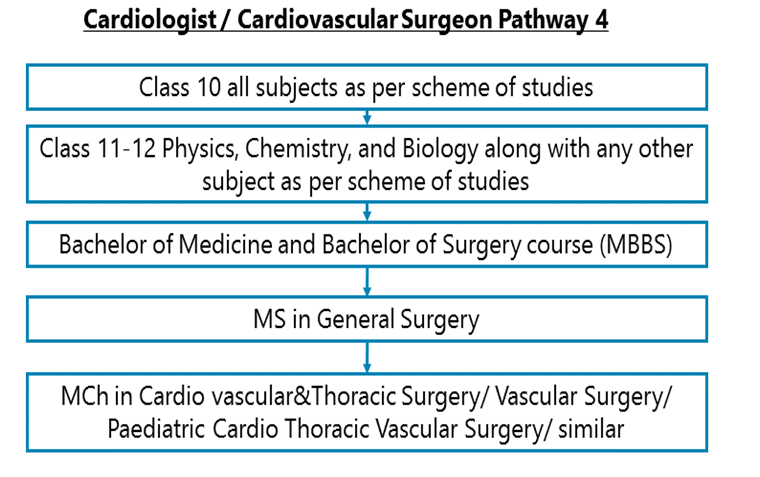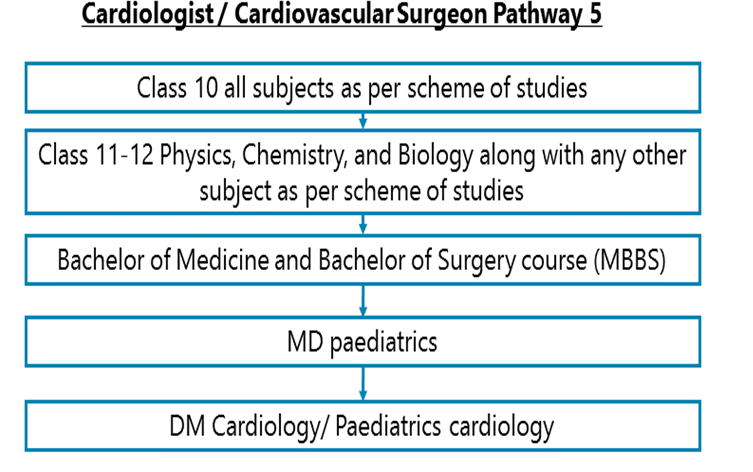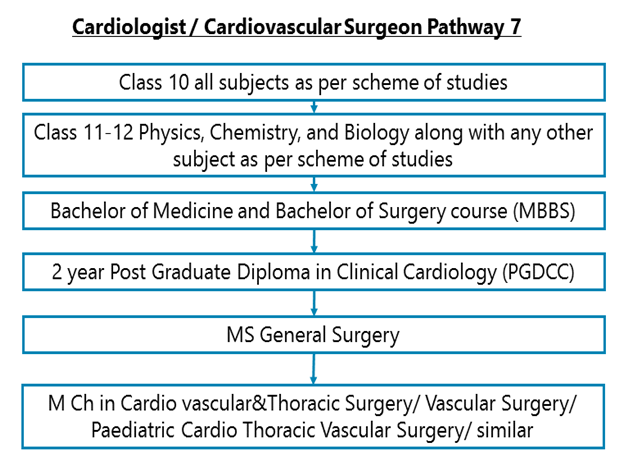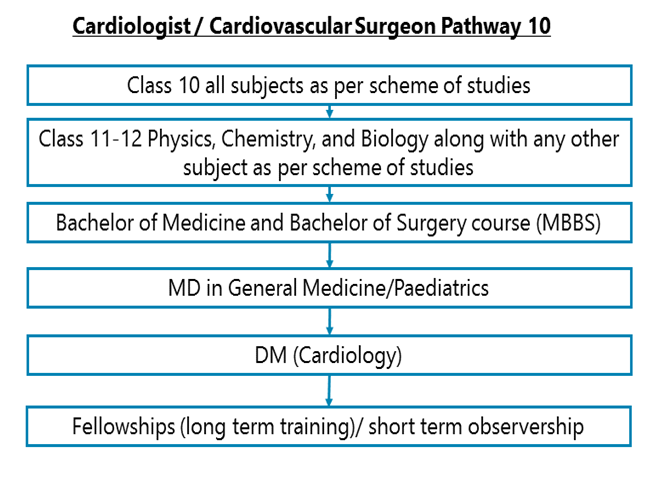Cardiologist / Cardiovascular Surgeon
Entry Level Qualification
12
Career Fields
Medical Services
For Specially Abled



About Career
PARTICULARS | DESCRIPTION |
Name | Cardiologist / Cardiovascular Surgeon |
Purpose | diagnose and treat heart conditions |
Career Field | Medical Services |
Required Entrance Exam | NEET UG, NEET PG |
Average Salary | 1200000 - 1400000 Rs. Per Year |
Companies For You | Christian Medical College, Apollo, Fortis, Narayana & Many More |
Who is Eligible | Class 12th Pass |
1. Cardiologists or Cardiovascular Surgeons assist patients with medical diagnosis and treatment of congenital heart defects, coronary artery diseases, heart failure, valvular heart disease, electrophysiology among numerous other cardio-vascular disorders or ailments.
2. However, the surgical aspects are not included in cardiology and are in the domain of cardiothoracic surgery although the insertion of stents and pacemakers is performed by cardiologists sometimes too, but coronary artery bypass surgery (CABG), cardiopulmonary bypass, valve replacement are some of the many surgical procedures that are performed by surgeons, not cardiologists.
3. A diagnosis of heart or vascular disease often begins with a primary care doctor/general physician, who then refers a patient to a cardiologist. As a cardiologist, you will have to evaluate symptoms and medical history or may recommend tests for a more definite diagnosis. Then, you will decide if the condition can be managed using medicines or other available treatments. If you think that the patient needs surgery, then you will recommend a cardiovascular surgeon, who specializes in operations on the heart, lungs, and blood vessels.
4. Moreover, the study of adult and child heart disorders is through very different training pathways. So, an adult cardiologist (often simply called "cardiologist") is inadequately trained to take care of children, and pediatric cardiologists are not trained to take care of adult heart disease. Similarly, cardiac geriatricians specialize in coronary diseases of the elderly.
5. CVD (Cardiovascular Diseases) is the leading cause of death worldwide. WHO estimates that by 2030, 23.6 million people will die from CVD conditions annually — mostly due to stroke and heart disease.
Various types of treatments
Heart disease treatments vary by condition. For instance, if you detect a heart infection in a patient, you're likely to treat with just antibiotics& probiotics. In general, treatment for heart diseases usually includes:
1. Lifestyle changes: This will typically be your first recommendation to patients without acute illnesses in order to monitor whether the prevailing conditions subside as a result. These include eating a low-fat and low-sodium diet, getting at least 30 minutes of moderate exercise on most days of the week, quitting smoking, or limiting alcohol intake.
2. Medications: If you find lifestyle changes alone aren't enough, you may prescribe medications to control a heart disease. The type of medication will depend on the type of heart disease.
3. Medical procedures or surgery: Subsequently, if medications do not turn out to be working, it's possible you will recommend specific procedures or surgery. The type of procedure will depend on the type of heart disease and the extent of the damage to your heart.
Functional Fields of Work
Clinical / Diagnostic / Operative Care:
Work involves diagnoses, prognoses (how a disease progresses & assessing that progress) and treatment/therapy provided to patients suffering from cardiovascular diseases or clinical conditions some of which are angina, bradycardia, cardiac amyloidosis, cardiac sarcoidosis, diabetic nephropathy, heart valve disease, myocardial ischemia, pericarditis, rheumatic heart disease etc. Treatment could be done by surgery or through the administration of internal medicine.
Medical Research
1. You can pursue a career as a physician-scientist. Work will be completely laboratory-based sometimes involving field collections of biologic samples (human/animal). Depending on your interest, there are several different disciplines to choose from, including laboratory science, clinical research, and health services research.
2. Researchers often work at academic medical centers, for the pharmaceutical industry, or with the government. If you’re considering a career in research, it will be important to maximize your research experiences during medical school.
3. You can do this by participating in a research project, taking a gap year for a research scholars’ program or other structured research experience, or participating in summer research internships.
4. For an example, you may be board-certified in Internal Medicine (for a practice license) and an Associate Professor of Medicine as well, simultaneously you may also be a recipient of research grants from different sources and pursue scientific research on an implantable cardiac alert system for early recognition of myocardial infarction if you are researching on the development of novel screening and therapeutic strategies or new therapies.
5. Research may also revolve around novel drug delivery mechanisms or for testing new drugs such as self‐assembled fluorescent nanoprobes used for imaging & therapy of cardiac ischemia/reperfusion injury etc. Or to determine the stability of a newly discovered nanoparticle‐loaded adipose‐derived stem cell therapy.
Education and Training:
Typically, in medical colleges and universities, all educators are involved in training and educating aspiring doctors. This includes operative techniques & experiences as well as theoretical lectures to develop a deep understanding of clinical and basic sciences surrounding Cardiac Sciences and its various sub-specialties including the principles of disease investigation, interpretation of diagnostic test results and employed technologies.
Key Roles and Responsibilities
As a Cardiologist / Cardiac Surgeon, depending on your functional field of work, you will be engaged with one or moreof the following roles and responsibilities: -
Clinical / Diagnostic / Operative Care:
1. You will be examining a patient (physical examination and primary screening) for diagnosis of and obtaining information on medical/physical conditions, history, and tendencies to ascertain necessary medical attention or required surgical procedures.
2. You will be diagnosing bodily disorders and clinical conditions and suggest therapeutic treatments, such as prescribing medicines or necessary surgeries, in hospital wards, clinics, or operating rooms.
3. You will be determining the nature of the treatment, conferring with other medical professionals if required for or to obtain historical data to construct a patient’s medical portfolio and plan further treatment - advising throughout the prognosis (progression) of a disease.
4. You will be involved in recording the patient’s condition or progress throughout the tenure of your treatment sessions, writing reports and maintaining proper registers containing patient information (case histories).
5. You will be managing surgery services, including performing surgeries, planning, arranging, scheduling and coordinating processes, or procuring of equipment and supplies.
Medical Research:
1. You will plan, organize, coordinate & participate in scientific research projects, in collaborative work on study/experiment design, data analysis, & manuscript preparation for various scientific projects.
2. You will identify & implement strategies to enhance collaboration between investigators and clinical or research scientists.
3. You will recruit healthy & affected individuals for a period of close monitoring of their personal clinical response to disease stimulants or to obtain biologic samples from these participants for extensive analysis.
4. You will determine specific goals or objectives to be obtained; evaluate research data and develop & revise techniques or approaches to work problems.
5. You will function in a separate & independent manner in the design and initiation of research experiments.
6. You will design, develop or adapt equipment used in experiments or research to obtain desired results. You will be responsible for laboratory equipment and implementing safety procedures.
7. You will independently compose abstracts, technical reports, slide presentations, posters, spreadsheets, and manuscripts for submission to corporate and federal sponsors, conferences, and scientific journals.
8. You will produce medical illustrations, scientific posters, publication graphics, and slide presentations for national & international meetings.
Education and Training:
1. You will be involved in instructing/teaching to a class of students pursuing postgraduate or higher levels or study in the fields of Medical / Surgical Cardiac Sciences or related disciplines.
2. You will demonstrate techniques or handling of instruments/tools to your students inside an operation theatre and counsel/guide students in the performance of operative experiments.
3. You will participate in seminars, medical congresses, and conferences across the world.
Career Entry Pathway
Class 10 all subjects as per scheme of studies – Class 11-12 Physics, Chemistry, and Biology along with any other subject as per scheme of studies – MBBS - MD in Medicine/ Internal Medicine / General Medicine /similar - DM (Cardiology)
After completing Class 11-12 Physics, Chemistry, and Biology along with any other subject as per scheme of studies, you need to finish your graduation with a MBBS degree. Then go for MD in Medicine/ Internal Medicine / General Medicine /similar. Then go for DM (Cardiology).
Class 10 all subjects as per scheme of studies – Class 11-12 Physics, Chemistry, and Biology along with any other subject as per scheme of studies – MBBS - MD in Internal Medicine/similar – DNB in Cardiology
After completing Class 11-12 Physics, Chemistry, and Biology along with any other subject as per scheme of studies, you need to finish your graduation with a MBBS degree. Then go for MD in Medicine/ Internal Medicine / General Medicine /similar. Then go forDNB in Cardiology.
Class 10 all subjects as per scheme of studies – Class 11-12 Physics, Chemistry, and Biology along with any other subject as per scheme of studies – MBBS – 2 year Diploma in Paediatrics (DCH) or similar – 3 year MD Paediatrics – DM Paediatrics Cardiology
After completing Class 11-12 Physics, Chemistry, and Biology along with any other subject as per scheme of studies, you need to finish your graduation with a MBBS degree. Then go for a 2 year Diploma in Paediatrics (DCH) or similar followed by 3 year MD Paediatrics and DM Paediatrics Cardiology.
Class 10 all subjects as per scheme of studies – Class 11-12 Physics, Chemistry, and Biology along with any other subject as per scheme of studies – MBBS – MS in General Surgery – MCh
After completing Class 11-12 Physics, Chemistry, and Biology along with any other subject as per scheme of studies, you need to finish your graduation with a MBBS degree. Then go for MS in General Surgery followed by MCh in Cardiovascular&Thoracic Surgery/ Vascular Surgery/ Paediatric Cardio Thoracic Vascular Surgery/ similar.
Class 10 all subjects as per scheme of studies – Class 11-12 Physics, Chemistry, and Biology along with any other subject as per scheme of studies – MBBS – MD Paediatrics – DM Cardiology/ Paediatrics Cardiology
After completing Class 11-12 Physics, Chemistry, and Biology along with any other subject as per scheme of studies, you need to finish your graduation with a MBBS degree. Then go for MD Paediatrics and DM Cardiology/ Paediatrics cardiology.
Class 10 all subjects as per scheme of studies – Class 11-12 Physics, Chemistry, and Biology along with any other subject as per scheme of studies – MBBS - PGDCC – MD General Medicine – DM Cardiology
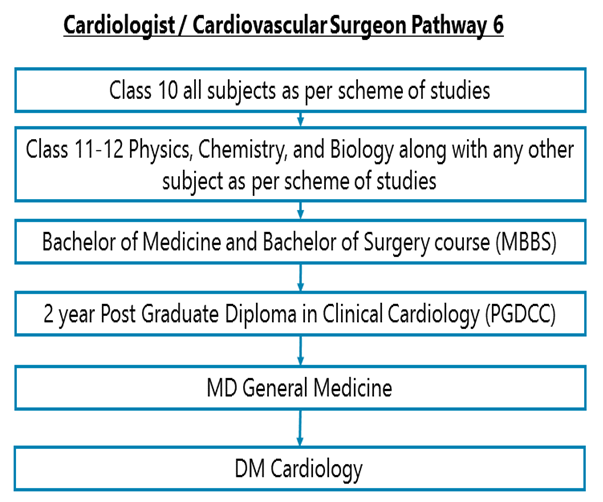
After completing Class 11-12 Physics, Chemistry, and Biology along with any other subject as per scheme of studies, you need to finish your graduation with a MBBS degree. Then go for 2 year Post Graduate Diploma in Clinical Cardiology (PGDCC) program followed by MD in General Medicine then DM Cardiology.
Class 10 all subjects as per scheme of studies – Class 11-12 Physics, Chemistry, and Biology along with any other subject as per scheme of studies – MBBS - PGDCC – MS General Surgery – M Ch
After completing Class 11-12 Physics, Chemistry, and Biology along with any other subject as per scheme of studies, you need to finish your graduation with a MBBS degree. Then go for 2 year Post Graduate Diploma in Clinical Cardiology (PGDCC) program followed by MS in General Surgery then M Ch in Cardiovascular & Thoracic Surgery/ Vascular Surgery/ Paediatric Cardio Thoracic Vascular Surgery/ similar.
Class 10 all subjects as per scheme of studies – Class 11-12 Physics, Chemistry, and Biology along with any other subject as per scheme of studies – MBBS - MS / MD in General Surgeryor Medicine respectively – DM Cardiology / M Ch - FRCS / MRCS / MRCP exams (Specific to UK, Ireland)
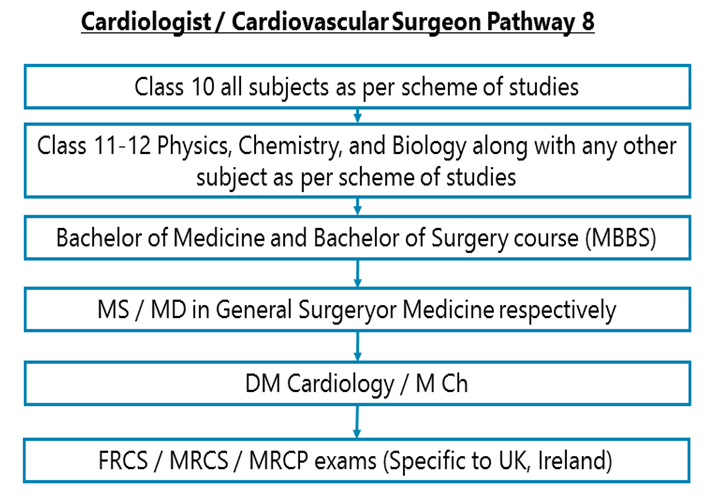
After completing Class 11-12 Physics, Chemistry, and Biology along with any other subject as per scheme of studies, you need to finish your graduation with a MBBS degree. Then you mustacquire MD / MS degree in any discipline. MD is oriented towards Internal Medicine but if you want to be a Surgeon, you will have to go for an MS instead of MD after MBBS. Thereafter complete DM in Cardiology or M Ch in Cardiovascular&Thoracic Surgery/ Vascular Surgery/ Paediatric Cardio Thoracic Vascular Surgery/ like specialize in this discipline. Then go for MRCP / MRCS / FRCS certifications. These exams are conducted in India at various locations.
Class 10 all subjects as per scheme of studies – Class 11-12 Physics, Chemistry, and Biology along with any other subject as per scheme of studies – MBBS– MCAT – 4-year MD in US - USMLE exam (specific to USA)
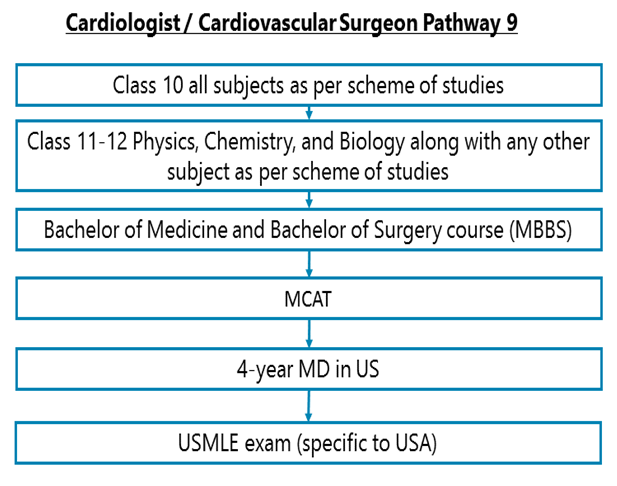
After completing Class 11-12 Physics, Chemistry, and Biology along with any other subject as per scheme of studies, you need to finish your graduation with a MBBS degree then appear for MCAT. While you are completing your graduation degree, you will have to decide whether you want to obtain further education in the US or practice directly there. If you want to study further and then practice medicine or surgery in the US, you will have to first appear for the MCAT exam and finish the 4 year MD course there (equivalent to MBBS in India). In US, all courses after MD involves Residency and generally one does not get any more degree but obtain Fellowships after residencies. After your MD from an American medical college, you will have to appear for USMLE to obtain licensure for practicing as a medical professional in the US and start with a residency there.
Class 10 all subjects as per scheme of studies – Class 11-12 Physics, Chemistry, and Biology along with any other subject as per scheme of studies – MBBS – MD in General Medicine/Paediatrics– DM in Cardiology– Fellowships (long term training)/ short term observership
After completing Class 11-12 Physics, Chemistry, and Biology along with any other subject as per scheme of studies, you need to finish your graduation with a MBBS degree. Then go for MD in General Medicine/Paediatrics followed by DM in Cardiology/Paediatric Cardiology. Then go for Fellowships (long term training) or short term observer ships to specialize further in this discipline.
Required Qualification & Competencies
1. After Class 11-12, you must go for your Bachelor of Medicine and Bachelor of Surgery course (MBBS). Various forms of this qualification’s name are MB ChB, MB BChir, BM BCh, BMBS and MB BCh around the globe.
2. After your graduation, you must go for a Master / postgraduation PG level program like MD, DNB, MS and complete junior residencies to specialize in various branches of Medicine or surgery.
3. DNB is considered equivalent to MD / MS. The only difference is for MD and MS you will be trained in medical colleges with hundreds of patients and for DNB you will be trained in big private hospitals with a much lesser number of patients.
4. After postgraduation, you can further proceed with FNB, M Ch, DM or PDCC if you want to higher qualifications or obtain PhD if you want to be a Medical Scientist.
You are also advised to obtain memberships (life/short term) of various associations/societies such as:
1. International Society of Heart & Lung Transplantation (ISHLT)
2. Ross Community
3. National Academy of Medical Sciences (MNAMS)
4. Society of Thoracic Surgeons (STS)
5. European Association for Cardio-Thoracic Surgery (EACTS)
6. International Society of Minimally Invasive Cardiac Surgery (ISMICS)
7. Indian Association of Cardiovascular & Thoracic Surgeons of India (IACTS)
8. Indian College of Cardiology
9. Indian Association of Cardiothoracic Surgeons (FIACS)
10. Heart Failure Society of India
11. Cardiothoracic Net (CTSNet)
12. Indian Medical Association (IMA)
In the UK, MRCP / MRCS / FRCS is mandatory to practice as a Cardiologist / Cardiovascular Surgeon.
1. You have to qualify graduation from any medical school (in UK or any other country including India), complete MD/MS (if you are studying in India) and obtain your MRCP / MRCS qualification from any of the Royal Colleges (Edinburgh, Glasgow, London – for medicine / radiation; England, Edinburgh, Glasgow, Ireland – for surgery).
2. For Medicine, there are 3 Royal Colleges that grant membership certifications: in Edinburgh, Glasgow and London.
3. MRCS (for membership) and FRCS (for fellowship) are for practicing surgeons.
4. For Surgery, membership certificates are granted by any of the 4 Royal Colleges: Royal College of Surgeons of England, the Royal College of Surgeons of Edinburgh, the Royal College of Physicians and Surgeons of Glasgow and the Royal College of Surgeons in Ireland
5. MRCS and MRCP are conducted by each college separately. FRCS (only for surgical specialties) is an examination which is jointly conducted by a mutual committee formed by all 4 Royal Colleges of Surgery (called Joint Committee on Intercollegiate Examinations).So there are 3 different MRCP exams by 3 different colleges, 4 different MRCS exams by the 4 different colleges and 1 FRCS exam jointly conducted which is the International Fellowship Examination (JSCFE).Each exam has its own format that can be referred to from respective portals of conducting bodies.
6. Also, if you (an aspiring surgeon) pass MRCS of 1 college or FRCS (the joint exam for Fellowship), you are eligible to be transferred as a member of any RCS by submitting the relevant transfer form.
7. You can appear for any MRCP or MRCS exams from India. You can also appear for the International Fellowship Examination (JSCFE) exam from India. Exam centers in India include many cities such as New Delhi, Hyderabad, Chennai etc. The fee for New Delhi is the lowest usually. The Indian locations are detailed on the individual websites of the 7 colleges (4 for surgery and 3 for medicine) and those for JSCFE
8. For JSCFE, you will have a maximum of 7 years to complete the 2 sections of this exam, Section 1 & Section 2. You will have a 2 year period from your 1st attempt with a maximum of 4 attempts for Section 1 and a maximum of 4 attempts with no re-entry for Section 2. Section 1 is further divided into Paper 1 and Paper 2. Section 2 is the clinical component of JSCFE consisting of a series of carefully designed & structured interviews on clinical topics.
9. Aiming the UK, it will be most profitable of you also earn registrations with established bodies such as AHCS (The Academy for Healthcare Science), RCCP (The Registration Council for Clinical Physiologists), or HCPC (Health and Care Professions Council).
10. If you are targeting US or Canada, remember, you will have to clear USMLE after you complete an MBBS program in India to be able to directly practice in the US. To study in medical schools in USA or Canada for an MD degree before practicing there, you will have to clear MCAT. Medical College Admission Test (MCAT) is a compulsory test for anyone who plans to get admission in medical schools of USA and Canada. MD degrees are followed by 3 to 7 years of residency. Graduates can practice any specialty. Physicians are fully certified after passing board exams. 152 MD-granting schools in the United States and 17 in Canada.
11. MCAT consists for 4 distinct sections which are individually scored. Each section is allotted either 90 or 95 minutes and tests between 50 and 60 questions. Including breaks, the full examination lasts approximately 7.5 hours.
12. Most MBBS graduates go for further study by passing MCAT, completing 4- year MD in US or Canada and then appearing for USMLE because this way is easier. However, some MBBS graduates avoid this path and directly aim at USMLE from India but cannot succeed as they lack US-based education which is extremely essential in order to pass USMLE.
13. MCAT is administered 25 times in a year. With a pass in MCAT, they will need to complete a medical degree (MD) in the US or Canada which is for 4 years. Then they can appear for USMLE and get a practice license.
14. Remember: after passing USMLE once, you cannot repeat it for attempting a better score. Programs usually eliminate candidates with multiple attempts. For this reason, it is essential to do extremely well in the first attempt. Further, your answers will not be evaluated on a population curve basis; you will be marked on the level of difficulty of the items you have attempted during the examination.
15. Indian graduates from any other discipline in India (other than MBBS) are also eligible to practice as a Medical Professional in the US but they have to appear for MCAT with a ‘special permission’ from Association of American Medical Colleges (AAMC) ,If you are specially permitted by AAMC, which is rare, you can then attempt & clear MCAT, then pass 4-year MD, then clear USMLE and then practice in US / Canada.
So, in shor
MBBS in India > MCAT > Basic Medical Degree in US / Canada (MD) > USMLE >Practice
Alternatively, a tougher router is,
MBBS in India > USMLE >Practice
For non-medical graduates from India,
Bachelor degree (duration is not a factor) > MCAT with special permission> Basic Medical Degree in US / Canada (MD) > USMLE >Practice
MINIMUM EDUCATION REQUIRED | MAXIMUM EDUCATION REQUIRED |
Under Graduate Undergraduate Degree / Honours Diploma / Graduate Diploma (equivalent to a Degree) Programs for which the minimum eligibility is a pass in Higher Secondary / Class XII School Leaving examination. | Post-Doctoral Post Ph.D. programs for which the minimum eligibility is a Doctoral degree. |
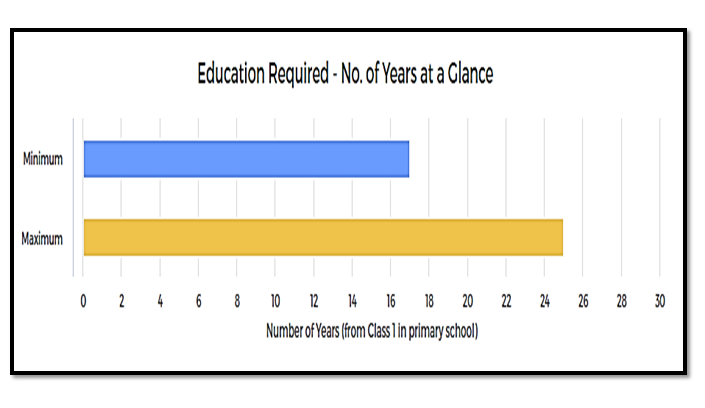
Competencies Required
Interests
1. You should have interests for Investigative Occupations. Investigative occupations involve working with ideas and quite a lot of thinking, often abstract or conceptual thinking. These involve learning about facts and figures; involve use of data analysis, assessment of situations, decision making and problem solving.
2. You should have interests for Realistic Occupations. Realistic occupations involve more practical and hands-on activities than paperwork or office work. Realistic occupations often involve physical activities for getting things done using various tools and equipment.
3. You should have interests for Social Occupations. Social occupations involve helping or assisting others; these involve working with and communicating with people to provide various services; these may involve educating and advising others.
Knowledge
1. You should have knowledge of Medicine - the science of diagnosis, treatment and prevention of human diseases, ailment, injuries and disorders. This includes understanding the symptoms, knowledge of the diagnostic processes, knowledge of the treatment procedures and medicines, and preventive healthcare measures.
2. You should have knowledge of Healthcare Science and Services - different fields which are related to offering various types of healthcare services to people; assisting physicians and surgeons to carry out diagnosis, treatment and prevention of human diseases, ailment and disorders. This includes knowledge of different practices apart from medicine which are used to treat and prevent human diseases or to provide holistic healthcare and wellness. This also includes knowledge about drugs and medicines.
3. You should have knowledge of Biological Sciences - humans, their anatomical structure, cell structure, tissues, physiological functions, evolution, and all other related aspects.
Skills
1. You should have Active Listening Skills - Giving full attention to what other people are saying, understanding the points being made by others, asking questions, etc.
2. You should have Critical Thinking skills- Skills in the analysis of complex situations, using logic and reasoning to understand the situations and take appropriate actions or make interpretations and inferences.
3. You should have Reading Comprehension Skills - Skills in understanding written sentences and paragraphs in work related documents.
4. You should have Instruction Skills - training others how to do something.
5. You should have Judgment and Decision Making Skills - considering pros and cons of various decision alternatives; considering costs and benefits; taking appropriate and suitable decisions.
6. You should have Problem Solving Skills - Skills in analysis and understanding of problems, evaluating various options to solve the problems and using the best option to solve the problems.
7. You should have Persuasion Skills- persuading others to change their minds or behaviour.
Ability
1. You should have Oral Comprehension Ability - listen to and understand information and ideas presented through spoken words and sentences.
2. You should have Oral Expression Ability - communicate information and ideas in speaking so others will understand.
3. You should have Deductive Reasoning Ability - apply general rules and common logic to specific problems to produce answers that are logical and make sense. For example, understanding the reasons behind an event or a situation using general rules and common logic.
4. You should have Problem Sensitivity - The ability to tell when something is wrong or is likely to go wrong. It does not involve solving the problem, only recognizing there is a problem.
5. You should have Inductive Reasoning Ability - The ability to combine pieces of information from various sources, concepts, and theories to form general rules or conclusions. For example, analysing various events or situations to come out with a set of rules or conclusions.
6. You should have Near Vision - The ability to see details at close range (within a few feet of the observer).
7. You should have PerceptualSpeed - The ability to quickly and accurately compare similarities and differences among sets of letters, numbers, objects, pictures, or patterns. The things to be compared may be presented at the same time or one after the other. This ability also includes comparing a presented object with a remembered object.
8. You should have Arm-Hand Steadiness - The ability to keep your hand and arm steady while moving your arm or while holding your arm and hand in one position.
Personality Traits
1. You are always or mostly careful about your actions and behaviour.
2. You are always or mostly disciplined in your action and behaviour.
3. You are always or mostly a soft-hearted person.
4. You are always or mostly helpful to others.
5. You are always calm or generally remain calm in most situations.
6. You can always act independently or could do so in most situations.
Career - Job Opportunities & Profiles
In India, after a DM/ MCh you can get a job as a Consultant Cardiologist / Cardiac / Cardio-Thoracic Surgeon in any of the following healthcare establishments:
1. Multi-Specialist Government and private hospitals such as All India Institute of Medical Sciences (AIIMS), Christian Medical College, Apollo, Fortis, Narayana, Kasturba, Tata, Lilavati, Medanta, Kokilaben, King Edward Memorial, Max, Wockhardt, Sterling, Shalby, Medica, King George, Assam Medical College, Columbia Asia, Jaslok, AMRI, and so on.
2. You may also consult patients at various health clinics.
Most jobs for Specialist Consultant Physicians are contractual. Many of the Consultants work in more than one hospital.
1. If you want to pursue a career in teaching along with practice (practice means you will be involved in treating patients), you may join a teaching hospital as an Associate Professor, generally referred to as Medical College and Hospital such as the AIIMS, St. John, Kasturba Medical College, Maulana Azad Medical College, King George’s Medical College, Christian Medical College Vellore, Grant Medical College, Calcutta Medical College, Lady Hardinge Medical College, etc.In India, generally, an alumnus of a medical college is absorbed into the faculty of the college after their Senior Residency in that college itself.
2. If you want to pursue a career in Medical Research along with practice (practice means you will be involved in treating patients), then you may join any of the medical colleges which are involved in research such as the AIIMS, JIPMER Pondicherry, Institute of Medical Sciences, BHU, University College of Medical Science, Delhi University, Sri Ramachandra Medical College & Research Institute, Regional Medical Research Centre at Bhubaneswar and Dibrugarh, PGIMER, Chandigarh, IPGMER, Kolkata, etc.
Specialisation Tracks In This Career
1. Cardiologist - Cardiac Electrophysiology
Cardiac Electrophysiologists study the science of elucidating, diagnosing, & treating the electrical activities of the heart. They specialize in assessing complex arrhythmias, elucidating symptoms, evaluating abnormal electrocardiograms, assessing risk of developing arrhythmias in the future, and designing treatment. These procedures increasingly include therapeutic methods (like radiofrequency ablation) in addition to antiarrhythmic drug therapy and implantation of pacemakers and automatic implantable cardioverter-defibrillators (AICD).
2. Cardiologist – Cardio Geriatrics
Cardio geriatricians deal with the cardiovascular disorders in elderly people. Cardiac disorders such as coronary heart disease, including heart failure, myocardial infarction, cardiomyopathy, and arrhythmias and vascular disorders such as atherosclerosis and peripheral arterial disease are common and are a major cause of mortality in elderly people.
3. Cardiologist – Echocardiography
Some Cardiologists specialize in echocardiography which uses standard 2D, 3D, & Doppler ultrasound to create images of the heart. Echocardiography is 1 of the most widely used diagnostic tests in cardiology. It is routinely used in the diagnosis, management, and follow-up of patients with any suspected or known heart diseases. It can provide a wealth of helpful information, including the size & shape of the heart (internal chamber size quantification), pumping capacity, and the location and extent of any tissue damage.
4. Cardiologist - Pediatric Cardiology
Pediatric Cardiologists specialize in diagnosing and treating heart problems in children who might need heart surgery. Some are born with structural differences (congenital heart disease). Children are not just small adults. The kinds of heart problems children have are very different from adults. For example, children are more likely to be diagnosed with a heart difference that they were born with, but heart attacks in children are very rare. Pediatric cardiologists are specifically trained. To provide coordinated and comprehensive care, they also must closelywork with primary care pediatricians and other health care providers including pediatric heart surgeons, neonatologists, cardiac anesthesiologists, pediatric radiologists, cardiac pediatric intensivists, as well as pediatric nurses, nutritionists, speech/ occupational/ physical therapists etc.
5. Cardiologist - Interventional Cardiology
Interventional Cardiologists deal specifically with catheter based treatment of structural heart diseases. A catheter is a thin, flexible tube (with varying levels of stiffness) that can be inserted into a body cavity, duct, or vessel inside the body to treat diseases or perform a surgical procedure. Functionally, they allow drainage, administration of fluids or gases. A catheter can be left inside the body, either temporarily or permanently.
6. Clinical Cardiologist - Preventive Cardiology and Cardiac Rehabilitation
Clinical Cardiologists specializing in detecting cardiovascular disorders at an early age are said to be practicing preventive cardiology through routine preventive checkups, non-invasive tests, electrocardiography, stress tests, lipid profile & general physical examination. Cardiac rehabilitation is an upcoming branch of cardiology. Clinical Cardiologists specializing in cardiac rehabilitation help patients regain their overall strength and live a normal life after a cardiovascular event.
7. Cardio-Thoracic Surgeon
Cardio-Thoracic Surgeons perform different kinds of surgeries to treat patients suffering from cardio-vascular diseases. Few examples are: Open heart surgery - patient's heart is opened and surgery is performed on the internal structures of the heart which means that the heart should be stopped and drained of blood. Modern beating-heart surgery / bypass surgery - This is a more modern surgical technique. Cardiac Surgeons may specialize in this technique where the heart is beating during surgery but is stabilized to make the work area still so that surgeons can operate on a surface which is blood-free. The rest of the heart keeps pumping and circulating blood to the body. Minimally invasive surgery - This is where a machine,which is controlled by a Cardiac Surgeon, is used to perform surgery. The main advantage to this is the size of the incision made in the patient. For a Surgeon to manually perform an operative task the incision must be big enough to put his hands inside, but for a robot it does not have to be bigger than 3 small holes for its much smaller "hands" to get through. Lung volume reduction surgery / Lung Resection - parts of the lung are removed, allowing the remaining, relatively good lung to expand and work more efficiently. These surgeries are performed on patients who are suffering from conditions such as Lung cancer or tumor, emphysema, tuberculosis, bronchiectasis, lung abscess, atelectasis etc. These are done under general anesthesia.
Career Growth
1. In hospitals, if you are engaged as a practicing Consultant or as a Surgeon, there is no growth as such in terms of job positions, except being called a Senior Consultant or Senior Consultant Surgeon. You may also get into administrative roles such as a Head of a Department, President, Director, Chief Medical Officer, Chief Executive Officer, etc.
2. However, in teaching hospitals, if you are engaged in teaching along with practice, you may grow from an Associate Professor’s role to a Professor and then to a Senior Professor. Then you may move into administrative roles such as a Dean/ Director, etc.
3. If you are engaged at a medical research institution, you may grow from the position of a Senior Scientist to that of a Principal Scientist, then to a Deputy Director and Director.
Salary Offered
1. After your DM/ MCh, as a specialist Consultant Cardiologist or as a Consultant Surgeon (Cardiology), you will be getting about Rs. 1,00,000-1,30,000 a month to begin with at a Government hospital. At the private hospitals, you may get about Rs. 1,50,000-2,00,000 or even more a month depending upon your experience. As a Consultant Surgeon, you may earn more depending upon the number of surgeries you do in a month.
2. Remember that by the time you complete a DM / MCh, you will have at least 8 years of practice experience, first as a junior resident (3 years during MD/MS), then as a senior resident (3 years during DM/MCh) and considering 1 year gaps between MBBS and MD/MS and then another 1 year gap between MD/MS and DM/MCh). In most cases, however, it takes at least 10 years to complete a DM / MCh after MBBS.
3. With about 2-5 years post qualification experience (after DM/MCh), you will be making about Rs. 1,20,000 – 3,00,000 or more per month.
4. With about 6-12 years post qualification experience (after DM/MCh), you will be making about Rs. 1,80,000 – 5,00,000 or more per month.
5. Senior Specialist Consultants and Surgeons with about 15-20+ years post qualification experience (after DM/MCh), you will be making about Rs. 2,50,000 – 12,00,000 or more per month.
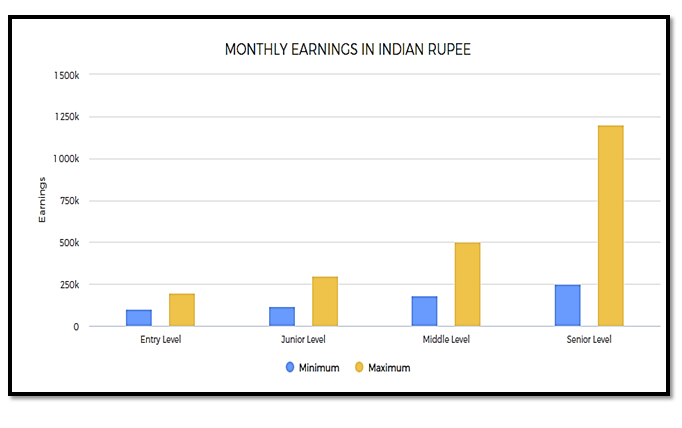
Monthly Earning In Indian Rupee
Entry Level | Junior Level | Mid Level | Senior Level | |||||
Min Earning | Max Earning | Min Earning | Max Earning | Min Earning | Max Earning | Min Earning | Max Earning | |
100000 | 200000 | 120000 | 300000 | 180000 | 500000 | 250000 | 1200000 | |
1. Entry level: 0 - 2 years of work experience
2. Junior Level: From 1 to 12 years of work experience
3. Mid-Level: From 5 to 20+ years of work experience
4. Senior Level: From 10 to 25+ years of work experience (there could be exceptions in some high-end technical, financial, engineering, creative, management, sports, and other careers; also in the near future, people will reach these levels much faster in many careers and in some careers, these levels will have no meaning as those careers will be completely tech skill driven such as even now, there is almost no level in a Cyber Security Expert’s job)
Work Activities
1. Analysing and interpreting data and information: Analysis of data and information to find facts, trends, reasons behind situations, etc.; interpretation of data to aid in decision making.
2. Assisting and caring for people: Assisting people in availing of services; taking care of people in different situations; offering help and services to others.
3. Communicating with co-workers and others: Communicating with people in writing, verbally or otherwise inside your workplace and various other people who have professional relationships with your place of work including vendors, government officials, etc. or with people at large
4. Developing and maintaining inter-personal relationships: Developing professional relationships with co-workers and others outside organisations and maintaining good relationships.
5. Getting Information and learning: Observing, hearing, reading, using computers, or otherwise obtaining information and learning from it.
6. Inspecting situations, events, and people: Inspecting situations, events and people to understand the reasons and causes for the situation or events to happen; inspecting people to understand reasons behind their behaviour and actions
7. Making decisions and solving problems: Analysis of data and information; evaluation of alternative decisions and results of decisions; taking the right decisions and solving problems.
8. Processing information: Compiling, tabulating, calculating, auditing, verifying or otherwise dealing with information processing including data entry, transcription, recording, storing and maintaining databases
9. Providing advices and consultation to others: Giving advices or consultation to others about various issues, conceptual matters, know-hows, scientific matters, products or services
10. Strategic planning: Developing visions and goals, developing strategies and action plans for achieving visions and goals.
11. Updating and using relevant knowledge: Keeping updated with the latest knowledge relevant to your fields of work and use of the relevant knowledge in getting things done.
12. Using computers for work: Using computers for day-to-day office work; using computer software for various applications in day-to-day professional work; entering data and process information; for writing.
13. Working directly with people: Working directly with people to offer them products and services, providing assistance, etc.
Future Prospects
1. The future of this pathway seems bright as the industry statistics are encouraging. The Healthcare Market in India has the potential to increase 3 fold to 133.44 billion US Dollars. Indian Government is willing to expand public health spending to 2.5% of GDP by 2025.
2. The Healthcare Industry in India is one of the fastest-growing sectors and it is expected to reach $280 billion. The major focus is on quality of service and hence skilled labor is much required to sustain the growth of this industry.
3. By 2025, medical spending in India is expected to grow by almost 9 to 12% making India one of the world’s top ten in this zone.
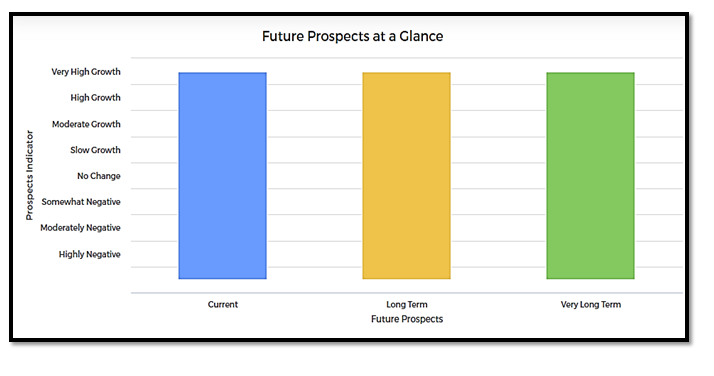
Future Prospects At A Glance
Current (0-1 year) | Long Term (2-5 year) | Very Long Term (6-10 years) |
Very High Growth | Very High Growth | Very High Growth |

